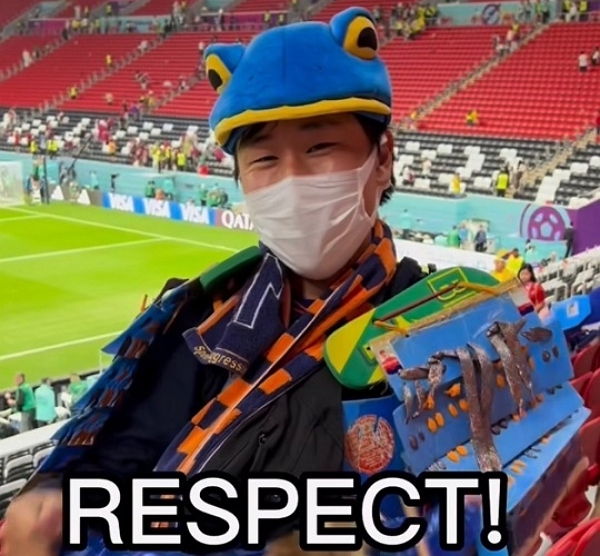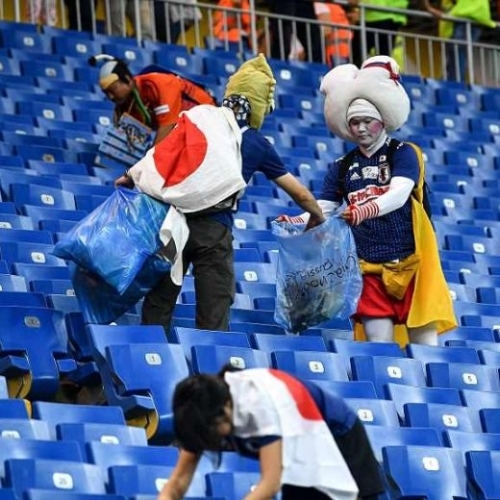When the final whistle blew at the opening match of the 2022 FIFA World Cup in Qatar, 70,000 fans began to rise from their seats, cheering, laughing, and rushing toward the exits.

The air was filled with noise — camera flashes, chants, and the rustling of flags waving in celebration. The match between Qatar and Ecuador had just ended, and for most spectators, the night was over.
But not for everyone.
In the midst of the departing crowd, a small group of people stayed behind. They weren’t taking photos or celebrating. They were bending down — picking up trash.
They were Japanese fans, and what they did that night quietly became one of the most powerful moments of the entire World Cup.
Even though Japan wasn’t playing that day, dozens of Japanese supporters had come to watch the opening match simply to experience the excitement of the tournament. When it was over, instead of joining the sea of people leaving the stadium, they reached into their bags, pulled out blue trash sacks they had brought from home, and began to clean.

They started with their own seats. Then the rows behind them. Then the aisles.
Plastic bottles, food wrappers, confetti, and flags — everything left behind was collected carefully and respectfully. They didn’t complain, didn’t speak loudly, and didn’t wait for anyone to notice. One by one, they worked together, passing bags around, laughing softly as they went.
Nearby fans looked on in disbelief. A few people started recording videos, capturing this unexpected act of quiet kindness. Within hours, those clips would travel around the world — shared by news outlets, athletes, and even FIFA itself.

One journalist wrote:
“The match is over, but something far more important is happening here. These Japanese fans are showing us what true respect looks like.”
The New York Post, BBC, and dozens of international media outlets covered the story. “Japanese fans clean up the stadium — again,” one headline read. “No team pride required. Just pride in themselves.”
What made the act so striking was that Japan hadn’t even played. They were cleaning up after other people’s celebration — after a match between Ecuador and Qatar. They could have easily walked away, just like everyone else. But they didn’t.
For them, cleaning up wasn’t an extraordinary act of heroism. It was simply a reflection of their values.
Back home, tidiness, responsibility, and community respect are woven into daily life.
Children in Japan are taught from a young age to clean their classrooms, wipe their desks, and take care of shared spaces. It’s not seen as punishment — it’s seen as pride. The idea is simple: you leave a place better than you found it.
And that night in Qatar, that lesson shone brighter than any fireworks in the sky.
As one fan told a reporter, “It’s not about who won or lost. The stadium belongs to everyone. We should all take care of it.”
For over an hour after the final whistle, they continued cleaning — even picking up trash that had been left by fans from other countries. Security guards and stadium workers stood by, unsure whether to intervene or to simply admire them.

Eventually, as the last of the crowd disappeared and the stadium grew quiet, the Japanese fans tied up their trash bags neatly, stacked them by the exit, and finally left — the very last spectators to go.
By the next morning, videos of their actions had gone viral. People from around the world praised them, calling their behavior “humbling,” “inspirational,” and “a glimpse of true humanity.”
It wasn’t the first time this had happened. During the 2018 World Cup in Russia, Japanese fans made international headlines for doing the same thing — staying after matches to clean the stands, even after Japan’s heartbreaking elimination from the tournament.
The BBC ran a story then titled, “Japanese Fans Win the World’s Hearts With Their Cleaning Habits.”

But this time, it was different. This wasn’t about national pride or celebrating victory. It was about gratitude — for the experience, for the game, for simply being there.
In a tournament that cost billions and drew fans from every corner of the planet, it wasn’t a goal or a trophy that left the deepest impression that night. It was the image of ordinary people with trash bags, bending down to pick up after others.
As one Qatari volunteer said later, “They reminded us that respect is a universal language. You don’t need words for it — only action.”

When the lights dimmed and the stadium emptied, the seats shone clean and quiet under the floodlights — a testament to a culture that believes small actions speak louder than applause.
And somewhere, long after the cameras stopped rolling, the world remembered that greatness isn’t just measured in goals scored or matches won. Sometimes, it’s found in the simple, humble act of cleaning up when no one else will.




